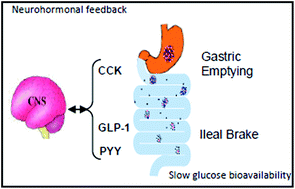Gut feedback mechanisms and food intake: a physiological approach to slow carbohydrate bioavailability
Abstract
Glycemic carbohydrates in foods are an important macronutrient providing the biological fuel of glucose for a variety of physiological processes. A classification of glycemic carbohydrates into rapidly digestible carbohydrate (RDC) and slowly digestible carbohydrate (SDC) has been used to specify their nutritional quality related to glucose homeostasis that is essential to normal functioning of the brain and critical to life. Although there have been many studies and reviews on slowly digestible starch (SDS) and SDC, the mechanisms of their slow digestion and absorption were mostly investigated from the material side without considering the physiological processes of their in vivo digestion, absorption, and most importantly interactions with other food components and the gastrointestinal tract. In this article, the physiological processes modulating the bioavailability of carbohydrates, specifically the rate and extent of their digestion and absorption as well as the related locations, in a whole food context, will be discussed by focusing on the activities of the gastrointestinal tract including glycolytic enzymes and glucose release, sugar sensing, gut hormones, and neurohormonal negative feedback mechanisms. It is hoped that a deep understanding of these physiological processes will facilitate the development of innovative dietary approaches to achieve desired carbohydrate or glucose bioavailability for improved health.

- This article is part of the themed collection: Probiotics, Prebiotics and Gut Health

 Please wait while we load your content...
Please wait while we load your content...